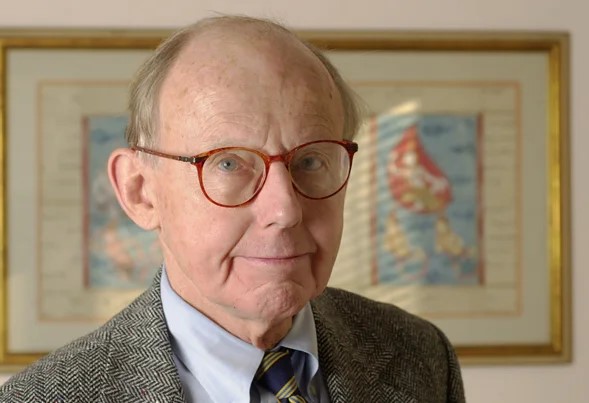As the saying goes, civilizations continue to collide: Who is Samuel Huntington?
Dangerous conflicts of the future; According to Huntington, Islam and Confucian (Cynic) civilizations will challenge Western civilization, saying that it will result from the interaction between the arrogance of the West, the intolerance of Islam, and the extreme stubbornness and assertiveness of the Chinese.

Samuel Phillips Huntington, one of the most important political scientists produced by the USA, was born in New York in 1927. He graduated from Yale University at the age of 18. At the age of 23, he became a lecturer at Harvard University. Starting from 1968, he started working as a consultant at the US State Department. Before his death, he was a lecturer at Harvard University's John M Olin Institute for Strategic Studies. He was also a consultant to the US Department of Defense. Huntington, who wrote 17 books, retired from Harvard in 2007.
Samuel Huntington, Professor of the Academy of Political Sciences at Harvard University, Director of International Relations at the same university, Head of International and Area Studies at Harvard, President of the American Political Science Association in 1986-1987, and President of the National Security Council and Security Planning Department at the White House in 1977-78. took on the duties of coordinator.
Samuel Phillips Huntington (April 18, 1927 – December 24, 2008) was an American political scientist, adviser, and academic. He spent more than half a century at Harvard University, where he was director of Harvard's Center for International Affairs and the Albert J. Weatherhead III University Professor.
Huntington, the founder of Foreign Affairs magazine;
1957 - The Soldier and The State
1957 - The Theory and Politics of Civil-Military Relations
1961 - Common Defense: Strategic Programs in National Policies
1968 - Political Order in Changing Societies
1981 - American Politics: The Promise of Disharmony
1991 - The Third Wave: Democratization in the Late Twentieth Century
1996 - The Clash of Civilizations and the Remaking of World Order
2004 - Who are we? The Challenges to America's National Identity
He has books called.
Huntington's special interests are; It is defined as national security, strategy and civil-military relations, democratization and political-economic development in underdeveloped countries, cultural factors in world politics, and American national identity.
Samuel Huntington is still considered a very important scientist, despite some of the provocative theories he developed. What makes Huntington unique is his ability to shape the changing dynamics of international politics in elegant and intriguing ways. This is because their analysis is largely based on conflict and power struggles.
Theses
"Clash of Civilizations"
In the geopolitical vacuum that emerged after the collapse of the Soviet Union, the most assertive and controversial geopolitical view is Samuel P Huntington's "Clash of Civilizations" thesis.
In 1993, Huntington wrote in his article "The Clash of Civilizations" in Foreign Affairs, the most influential magazine of American foreign policy circles; He argued that new conflicts in world politics would be culturally based, not ideological or economic, and therefore the era of the clash of civilizations had begun. Huntington expanded his article and published it in a book titled "The Clash of Civilizations and the Reestablishment of World Order" in 1996.
Huntington's thesis differs from the geography-based theories of classical geopoliticians and highlights the cultural structure of the struggle between states. Accordingly, the main factor that will shape the world's political environment will be differences in civilization.
Huntington, the world; He divided into eight civilization circles: Western, Confucian, Japanese, Islamic, Slavic-Orthodox, Latin American, Indian, and African civilizations. In his book published in 1996, Huntington used the more comprehensive term "Cynic Civilization" instead of Confucian civilization and said that this term also describes the common culture of China, Southeast Asia, Korea, and Vietnamese cultures. Likewise, he used the term "Hindu civilization" instead of Indian civilization. Although the book is similar to the article in many respects, it also added the Buddhist civilization as the ninth in the book to the eight civilizations in the article and included Tibet, Mongolia, and Cambodia in the said civilization.
Huntington sees the fault line between Western and Islamic civilizations as more important than the Catholic-Orthodox fault line. The author says that the struggles between Western and Islamic civilizations along the fault lines extending from the tip of Africa to Central Asia have been going on for 1300 years. He emphasizes that this line is not only a line of difference but also a line of bloody struggle. Huntington states that the major historical fault fractures between civilizations in Eurasia have flared up once again.
Dangerous conflicts of the future; According to Huntington, Islam and Confucian (Cynic) civilizations will challenge Western civilization, saying that it will result from the interaction between the arrogance of the West, the intolerance of Islam, and the extreme stubbornness and assertiveness of the Chinese.
According to Huntington, the first duty of Western civilization should not be to try to make other civilizations similar to itself, because it is impossible to achieve this with the power it has lost. Therefore, the first responsibility of the West and the United States, the most powerful Western country, should be to try to preserve, defend, and renew the unique features of Western civilization. For this purpose, the West, despite all its decreasing power; should harmonize its policies in a way that will ensure greater political, economic, and military integration and prevent states from other civilizations from exploiting their differences.
"Who are we?"
His book titled "Who Are We - The Challenges to America's National Identity", published in 2004, also created controversy. The book evaluates the clash of civilizations thesis from "inside" America and conveys its observations about the different cultures in the country. He considers the waves of immigration from Latin America, especially Mexico, as worrying, and proposes a return to the Anglo-Saxon-Protestant values of the first European immigrants, which the USA accepts as its true national identity. This approach caused a reaction, especially from Latin American organizations and left-liberal intellectuals.
